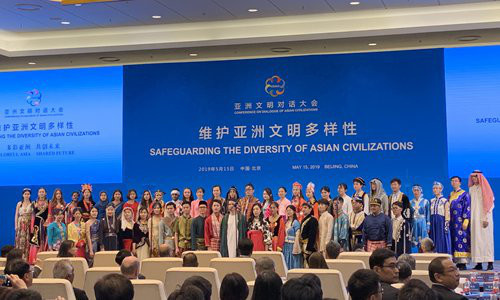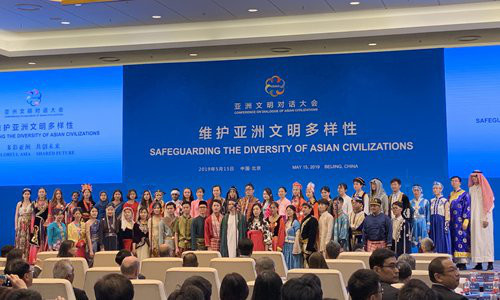By Zhao Yusha

International students who study in China and Chinese students perform before the opening of “Safeguarding the diversity of Asian civilization,” on May 15, which was part of the Conference on Dialogue of Asian Civilizations. Photo: GT/Zhao Yusha
China vowed to provide $1 million to aid scholars under 35 years old to conduct research on the Silk Road, which aims to promote education in a bid to push forward the dialogue between civilizations.
An agreement to sponsor young scholars was signed during the parallel session, “Safeguarding the diversity of Asian civilizations,” on May 15, which was part of the Conference on Dialogue of Asian Civilizations.
It was signed by Tian Xuejun, Chinese vice Minister of Education and Nada Al-Nashif, UNESCO Assistant Director-General of Social and Human Sciences.
This is the first international academic sponsorship project in social sciences between China and UNESCO.
The sponsorship aims to push forward communication among different civilizations and provide support for academic research about the Silk Road.
Much is needed to be done in order to push forward dialogue among Asian countries, which involves deepening the education exchange between Asian countries, said Chen Baosheng, China’s Education Minister, at the event.
Education can also play a role in pushing forward the dialogue between civilizations, Chen noted.
He mentioned that China has enhanced its support for Silk Road scholarships, and the number of students from Asian countries in China has greatly increased.
There were 295,000 students from other Asian countries coming to study China in 2018, and the number of Chinese students studying in Asian countries increased as well, said Chen.
About 97,000 Chinese students were studying in Asian countries in 2018, he said.
Lee Byong-hyun, chairperson of the UNESCO's Executive Board, said UNESCO’s “Routes of Dialogue” program has been going on for almost 40 years. As one of its flagship projects, UNESCO is reviving dialogue among countries along the historic Silk Road, bringing people across countries and continents through an online platform, which is generously supported by China and other countries.
Ambassadors from Asian countries, such as Afghanistan, Cambodia and Iraq, also attended the session, along with professors from non-Asian countries such as the US.
Chen said that China is undertaking the world’s largest-scale education system and is moving to modernize it.
Meanwhile, China has established educational ties with all Asian countries, and actively cooperated with many Asian universities.
Other Asian countries are more than welcome to benefit from China’s rapid development in education, he said.
He also said that China encourages other Asian countries to recognize each other’s academic qualifications, to exchange educational experiences and cultivate talent for each other.
Source:Global Times
An agreement to sponsor young scholars was signed during the parallel session, “Safeguarding the diversity of Asian civilizations,” on May 15, which was part of the Conference on Dialogue of Asian Civilizations.
It was signed by Tian Xuejun, Chinese vice Minister of Education and Nada Al-Nashif, UNESCO Assistant Director-General of Social and Human Sciences.
This is the first international academic sponsorship project in social sciences between China and UNESCO.
The sponsorship aims to push forward communication among different civilizations and provide support for academic research about the Silk Road.
Much is needed to be done in order to push forward dialogue among Asian countries, which involves deepening the education exchange between Asian countries, said Chen Baosheng, China’s Education Minister, at the event.
Education can also play a role in pushing forward the dialogue between civilizations, Chen noted.
He mentioned that China has enhanced its support for Silk Road scholarships, and the number of students from Asian countries in China has greatly increased.
There were 295,000 students from other Asian countries coming to study China in 2018, and the number of Chinese students studying in Asian countries increased as well, said Chen.
About 97,000 Chinese students were studying in Asian countries in 2018, he said.
Lee Byong-hyun, chairperson of the UNESCO's Executive Board, said UNESCO’s “Routes of Dialogue” program has been going on for almost 40 years. As one of its flagship projects, UNESCO is reviving dialogue among countries along the historic Silk Road, bringing people across countries and continents through an online platform, which is generously supported by China and other countries.
Ambassadors from Asian countries, such as Afghanistan, Cambodia and Iraq, also attended the session, along with professors from non-Asian countries such as the US.
Chen said that China is undertaking the world’s largest-scale education system and is moving to modernize it.
Meanwhile, China has established educational ties with all Asian countries, and actively cooperated with many Asian universities.
Other Asian countries are more than welcome to benefit from China’s rapid development in education, he said.
He also said that China encourages other Asian countries to recognize each other’s academic qualifications, to exchange educational experiences and cultivate talent for each other.
Source:Global Times
 Menu
Menu
 China pushes greater Asian dialogue
China pushes greater Asian dialogue
















